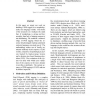Free Online Productivity Tools
i2Speak
i2Symbol
i2OCR
iTex2Img
iWeb2Print
iWeb2Shot
i2Type
iPdf2Split
iPdf2Merge
i2Bopomofo
i2Arabic
i2Style
i2Image
i2PDF
iLatex2Rtf
Sci2ools
133
click to vote
ACL
2006
2006
Morphological Richness Offsets Resource Demand - Experiences in Constructing a POS Tagger for Hindi
In this paper we report our work on building a POS tagger for a morphologically rich language- Hindi. The theme of the research is to vindicate the stand that- if morphology is strong and harnessable, then lack of training corpora is not debilitating. We establish a methodology of POS tagging which the resource disadvantaged (lacking annotated corpora) languages can make use of. The methodology makes use of locally annotated modestly-sized corpora (15,562 words), exhaustive morpohological analysis backed by high-coverage lexicon and a decision tree based learning algorithm (CN2). The evaluation of the system was done with 4-fold cross validation of the corpora in the news domain (www.bbc.co.uk/hindi). The current accuracy of POS tagging is 93.45% and can be further improved. 1 Motivation and Problem Definition Part-Of-Speech (POS) tagging is a complex task fraught with challenges like ambiguity of parts of speech and handling of "lexical absence" (proper nouns, foreign words...
ACL 2006 | ACL 2007 | Decision Trees | Pos Taggers | Rich Languages |
| Added | 30 Oct 2010 |
| Updated | 30 Oct 2010 |
| Type | Conference |
| Year | 2006 |
| Where | ACL |
| Authors | Smriti Singh, Kuhoo Gupta, Manish Shrivastava, Pushpak Bhattacharyya |
Comments (0)

